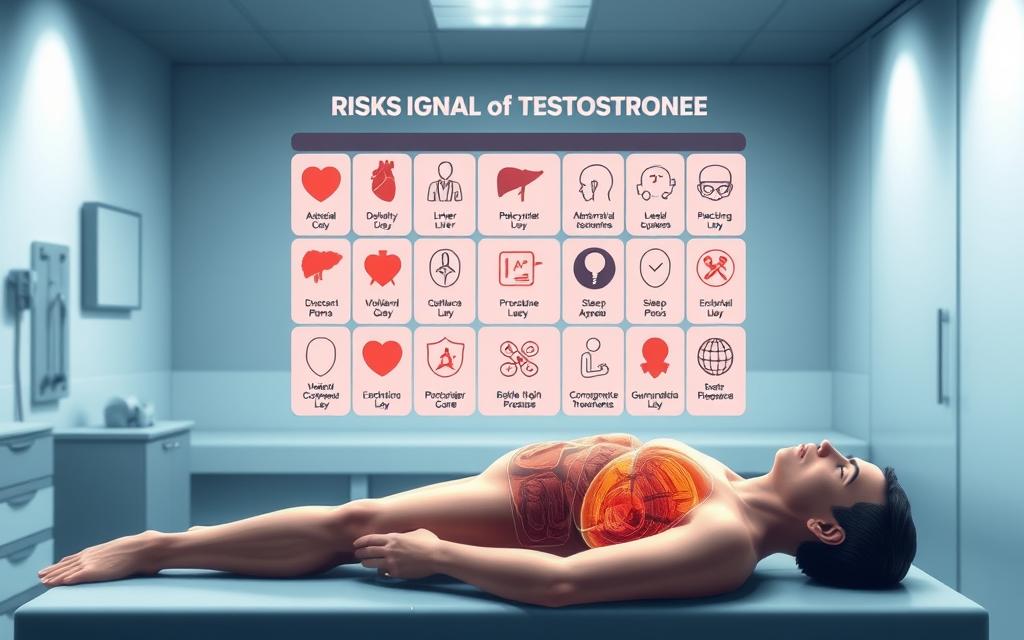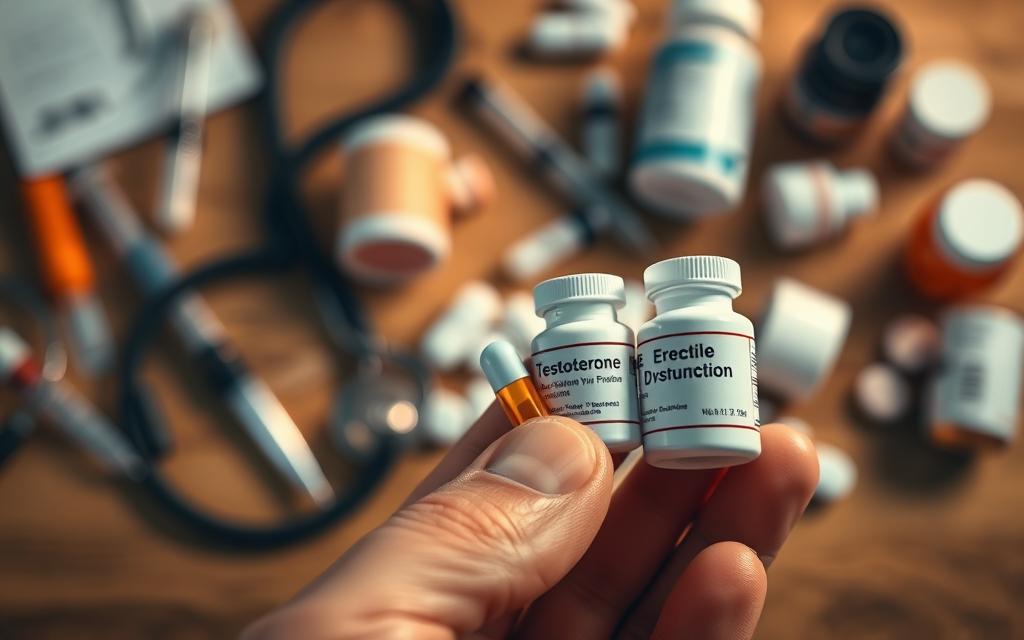Does Testosterone Treat Erectile Dysfunction? Understanding the Connection and Treatment Options
Understanding the link between testosterone and erectile dysfunction (ED) is crucial for men seeking effective treatment options. Testosterone plays a significant role in sexual health, influencing libido and the ability to achieve an erection.
Low testosterone levels, a condition known as hypogonadism, can contribute to ED, although it’s not the sole cause. Other factors, including cardiovascular disease, diabetes, and certain medications, can also impact erectile function.
Testosterone replacement therapy (TRT) has emerged as a potential treatment for ED in men with low testosterone. By restoring testosterone levels to a normal range, TRT can improve sexual function and overall quality of life.
It’s essential to consult with a healthcare professional to determine the underlying cause of ED and the most appropriate treatment plan.
Understanding Erectile Dysfunction: Causes and Mechanisms
Understanding the causes and mechanisms behind erectile dysfunction is crucial for developing effective treatment plans. Erectile dysfunction (ED) is a multifaceted condition influenced by a variety of factors.
Physical vs. Psychological Causes
Erectile dysfunction can stem from both physical and psychological causes. Physical causes include vascular diseases, diabetes, and neurological disorders, which can impair blood flow or nerve function necessary for achieving an erection. On the other hand, psychological factors such as stress, anxiety, and depression can also play a significant role in ED. For instance, a diet rich in processed foods, as discussed in our article on the worst foods for erectile dysfunction, can exacerbate physical conditions leading to ED.
| Cause | Description | Impact on Erection |
|---|---|---|
| Vascular Diseases | Affects blood flow | Impaired blood flow to the penis |
| Diabetes | Damages nerves and blood vessels | Nerve damage and reduced blood flow |
| Psychological Factors | Stress, anxiety, depression | Affects desire and ability to achieve an erection |
How Normal Erections Work
A normal erection occurs when there’s a complex interplay between neurological signals, hormonal changes, and vascular responses. The process begins with sexual arousal, which sends neurological signals to the penis, leading to the release of nitric oxide and subsequent vasodilation. This results in increased blood flow into the penis, causing an erection.
The Role of Testosterone in Male Sexual Function
The impact of testosterone on male sexual health cannot be overstated, as it influences libido, erectile function, and overall well-being. Testosterone is a hormone that plays a vital role in the development of male reproductive tissues and promotes secondary sexual characteristics.
How Testosterone Affects Libido and Erections
Testosterone significantly affects male libido, or sex drive. Low testosterone levels can lead to decreased sexual desire. Moreover, testosterone influences erectile function by regulating the physiological processes involved in achieving an erection. For instance, it helps in the production of nitric oxide, a crucial molecule for erectile function. Men with low testosterone may experience erectile dysfunction (ED), although it’s not the sole cause of ED. Consulting a professional can help determine the best course of action, such as visiting specialized centers for guidance on testosterone boosters for ED.

Signs and Symptoms of Low Testosterone
Recognizing the signs and symptoms of low testosterone is crucial for timely intervention. Common symptoms include decreased libido, fatigue, loss of muscle mass, and erectile dysfunction. Some men may also experience mood changes, such as depression or irritability. If you’re experiencing several of these symptoms, it’s essential to consult a healthcare professional for proper diagnosis and treatment. They can help determine if your symptoms are related to low testosterone levels and recommend appropriate treatments.
Does Drinking Water Help With Erectile Dysfunction?
Drinking enough water is essential for overall well-being, and research suggests it may also influence erectile function. Erectile dysfunction (ED) is a condition that affects millions of men worldwide, and while its causes are multifaceted, hydration plays a crucial role in maintaining vascular health, which is directly linked to erectile function.
The Science of Hydration and Blood Flow
Proper hydration is vital for maintaining healthy blood flow, which is essential for achieving and maintaining an erection. Dehydration can lead to decreased blood volume, reduced blood pressure, and consequently, impaired erectile function. Research has shown that even mild dehydration can cause significant decreases in blood flow and vascular function.
When the body is dehydrated, it prioritizes blood flow to vital organs over other areas, potentially compromising erectile function. Furthermore, dehydration can lead to an increase in blood viscosity, making it harder for the heart to pump blood effectively, which can further exacerbate ED.
Optimal Hydration Strategies for Sexual Health
To support sexual health and potentially alleviate ED symptoms, it’s crucial to adopt optimal hydration strategies. Here are some tips:
- Drink at least 8-10 glasses of water per day.
- Monitor urine output; if it’s pale yellow or clear, you’re likely hydrated.
- Avoid excessive caffeine and alcohol, as they can act as diuretics.
- Incorporate hydrating foods into your diet, such as watermelon and cucumbers.
By prioritizing hydration and maintaining a healthy lifestyle, individuals can support their overall vascular health and potentially improve erectile function.
Diagnosing Low Testosterone and Its Connection to ED
Diagnosing low testosterone and understanding its link to erectile dysfunction is crucial for effective treatment. Erectile dysfunction can stem from various factors, including physical, psychological, and hormonal imbalances. Low testosterone, or hypogonadism, is one such hormonal condition that can significantly impact a man’s sexual health.
Testing for Testosterone Levels
To determine if low testosterone is contributing to erectile dysfunction, healthcare providers typically conduct a series of tests. The primary test measures the level of testosterone in the blood, usually taken in the morning when testosterone levels are highest. Testosterone levels can fluctuate, so a single test may not be definitive; repeat testing may be necessary.
When Low T Is and Isn’t the Cause of ED
Low testosterone can be a contributing factor to erectile dysfunction, but it’s not the sole cause in many cases. Other factors, such as vascular disease, diabetes, or psychological issues, might be at play. Understanding the underlying cause is critical for selecting the appropriate low testosterone treatment. If low testosterone is identified as a contributing factor, treatment may involve testosterone replacement therapy or other interventions aimed at addressing the hormonal imbalance.
Testosterone Replacement Therapy Options
Testosterone replacement therapy (TRT) has emerged as a potential treatment for men experiencing low testosterone and associated erectile dysfunction. This therapy aims to restore normal testosterone levels, potentially improving symptoms related to low testosterone, including erectile dysfunction.
Injections, Gels, and Patches
TRT is available in various forms, each with its advantages and potential drawbacks. Injections are administered intramuscularly, typically every one to four weeks, providing a straightforward method of testosterone delivery. Gels and patches, on the other hand, offer more consistent testosterone levels throughout the day, with gels being applied daily to the skin and patches being worn on the body.
Pellets and Oral Medications
Other forms of TRT include pellets, which are implanted under the skin every three to six months, releasing testosterone slowly into the bloodstream. Oral medications, though less common due to potential liver toxicity concerns, are another option. Each method has its benefits and drawbacks, and the choice depends on individual patient needs and preferences.
Effectiveness for Treating ED
The effectiveness of TRT in treating erectile dysfunction varies among individuals. While some men experience significant improvements in erectile function, others may not notice a substantial difference. Factors influencing the effectiveness include the underlying cause of ED, the degree of testosterone deficiency, and the presence of other health conditions.
| TRT Method | Administration Frequency | Notable Advantages |
|---|---|---|
| Injections | Every 1-4 weeks | Straightforward, cost-effective |
| Gels | Daily | Consistent testosterone levels |
| Patches | Daily | Easy to apply, consistent levels |
| Pellets | Every 3-6 months | Long-lasting, convenient |
Potential Risks and Side Effects of Testosterone Treatment
While testosterone treatment can be beneficial for men with low testosterone, it’s essential to consider the potential side effects. Testosterone replacement therapy (TRT) is a medical treatment that can have various effects on the body, and understanding these effects is crucial for making informed decisions.
Short-term Side Effects
Some men may experience short-term side effects when undergoing testosterone treatment. These can include acne, sleep apnea, and changes in mood. It’s also possible for men to experience fluid retention, which can be a concern for those with pre-existing heart conditions.
A study on the short-term effects of testosterone therapy found that the most common side effects were mild to moderate. The table below summarizes some of the common short-term side effects reported:
| Side Effect | Frequency |
|---|---|
| Acne | 10% |
| Sleep Apnea | 5% |
| Mood Changes | 8% |
Long-term Health Considerations
Long-term health considerations are also crucial when evaluating testosterone treatment. There are concerns about the potential impact of TRT on cardiovascular health and prostate health. Men considering testosterone therapy should discuss these risks with their healthcare provider.

It’s essential for men to weigh the potential benefits of testosterone treatment against the potential risks and side effects. By understanding the possible effects of TRT, men can make informed decisions about their treatment.
Alternative and Complementary ED Treatments
The quest for effective erectile dysfunction treatment has led to the development of various complementary therapies. While traditional treatments remain a cornerstone, alternative approaches can offer additional benefits or serve as fallback options when primary treatments are ineffective.
First-line Medications (PDE5 Inhibitors)
Phosphodiesterase type 5 (PDE5) inhibitors, such as sildenafil (commonly known by the brand name Viagra), are often the first line of treatment for erectile dysfunction. These medications work by enhancing the effects of nitric oxide, a natural chemical the body produces that relaxes muscles in the penis, increasing blood flow. For those seeking alternative ED treatments when Viagra is not, other PDE5 inhibitors like tadalafil or vardenafil may be considered.
Lifestyle Modifications That Improve Erectile Function
Lifestyle changes can significantly impact erectile health. Regular exercise, a balanced diet, and maintaining a healthy weight can improve blood flow and overall cardiovascular health, which are crucial for erectile function. Quitting smoking and reducing alcohol consumption can also have a positive effect.
Other Medical and Surgical Options
For men who do not respond to first-line treatments, other medical and surgical options are available. This includes penile implants, vacuum erection devices, and medications that are injected directly into the penis. The choice of treatment depends on the underlying cause of ED, overall health, and personal preferences.
| Treatment Option | Description | Benefits |
|---|---|---|
| PDE5 Inhibitors | Oral medications that enhance nitric oxide effects, improving blood flow. | Effective for many men, easy to administer. |
| Lifestyle Modifications | Changes in diet, exercise, and habits to improve overall health. | Improves overall health, can enhance erectile function. |
| Penile Implants | Surgical devices implanted in the penis to enable erections. | High satisfaction rates, effective for severe ED. |
Conclusion: Creating a Personalized ED Treatment Plan
Erectile dysfunction treatment is not a one-size-fits-all solution. As discussed, various factors contribute to ED, including physical conditions like diabetes and hypertension, as well as psychological factors such as stress and anxiety. A personalized treatment plan takes into account the individual’s specific condition and needs.
Consulting a healthcare professional is crucial in determining the most effective treatment approach. They can help identify the underlying causes of ED and recommend suitable treatments, such as Eroxon, a topical gel that enhances blood flow to facilitate a natural erectile response. By understanding the available treatment options and their potential benefits, individuals can make informed decisions about their care.
A personalized treatment plan may involve a combination of lifestyle modifications, medication, and other therapies. By working with a healthcare professional, individuals can develop a tailored approach to addressing their ED, improving their overall sexual health and well-being.
